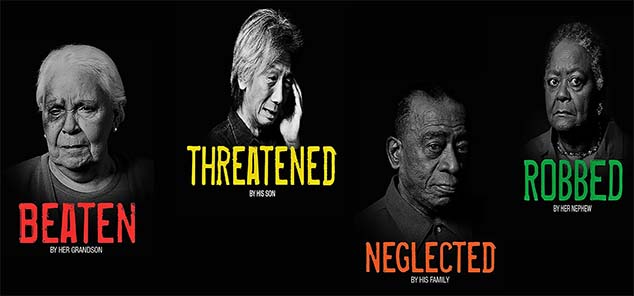Blog
Blog

By Elizabeth Daerr
•
16 Jun, 2020
Elizabeth Daerr, redrockspi.com Do you suspect that your elderly relative, friend or neighbor is being abused by a caregiver or guardian? One in 10 adults over 60 are reported victims of exploitation, financial fraud, or physical, emotional or sexual abuse, and researchers believe that number is low because many cases are not reported. Over the next 16 years, 10,000 baby boomers will turn 65 each day, and that means the problem of elder abuse could be growing. Elder abuse can be hard to substantiate and evidence is hard to gather without proper investigation. Victims may suffer from cognitive difficulties, making them less credible. Additionally, seniors may fear retaliation or the loss of care from the only person who helps them. And if the abuse is being caused by a child or grandchild, the elderly person may fear telling authorities because they do not want to be responsible for putting a family member in jail. Women are more likely to be victims of these crimes, but elder abuse can happen to men, who may be even less likely to report the incident. All socio-economic groups and races are vulnerable to this exploitation, and the events can occur anywhere, including the victim’s home, the perpetrator’s home, assisted living facilities, or nursing homes. The perpetrator could be a paid caregiver, a family member or intimate partner. Signs that your loved one could be experiencing some kind of abuse. Financial: According to Colorado Coalition for Elderly Rights and Abuse Prevention, financial abuse is the most common form of elder victimization, and a 2011 MetLife report states that $2.9 billion was wrongfully taken from seniors. Unauthorized, illegal, and improper use of financial resources of the victim takes many forms: co-mingling income of the senior with that of the caregiver; denying or limiting access to bank accounts and assets; not paying for adequate care out of the senior’s accounts; frequent “gifts” or payments to the caregiver; or a change of financial documents such as powers of attorney or wills. These actions are often achieved through forgery, intimidation, deception, or threats of refusing care. Neglect: Failure to give medications, provide food and water, take care of basic hygiene, or provide necessities such as hearing aids or dentures are neglectful and put the adult at risk of injury. Other signs of neglect include a victim confined to bed without care, untreated bed sores, or a demented individual being left without supervision. Psychological or emotional: An elder who shows unexplained or uncharacteristic changes is behavior, withdrawal, unexplained changes in alertness, or increased isolation may be experiencing abuse at the hands of a caregiver. Signs of abuse also include a caregiver being verbally aggressive or demeaning, as well as showing excessive concern about the senior’s spending habits. Physical and Sexual: Although least common and often unreported, this type of trauma is likely occurring when the senior shows inexplicable bruises, fractures, welts, cuts or sores. Unexplainable sexually transmitted diseases may also be present. Sexual or physical abuse can happen at the hands of a caregiver or another resident in a care facility. If you suspect any of these activities could be happening to your loved one, call us immediately. We will provide a free consultation. Let us know how we can help.

By Hibu Websites
•
16 May, 2019
Rachele Davis, newhopeinvestigations.com What is a background investigation? A background investigation is essentially the process of diving into a person’s or organization’s history to search for red flags as they pertain to the specific needs of the client who has hired the background to be completed. Background investigations are often equated to criminal record checks only...not always.

By Hibu Websites
•
08 Apr, 2019
Source: Rachele Davis, newhopeinvestigations.com It’s finally spring. Summer is just around the corner. Having recently moved to Denver Colorado from San Diego, every year, I tell myself I can do this…I can make it through another winter. As you can guess, I’m not much for cold weather. So in the spirit of spring and sunshine days that are thankfully soon to come, let’s celebrate with some of my favorite private investigator jokes. According to Victor Hugo, “Laughter is the sun that drives winter from the human face.” 1. My friend always tells everyone that he’s a private investigator. But within our group of friends, we know he’s just a gynecologist. 2. I enrolled in an online private investigator course, but I can’t get them to respond to my emails. I’m not sure if they are just ignoring me or if this is my first case. 3. Computer Hacking Job Interview An applicant interviewed at a big IT company for a “computer hacking investigator” position. The boss asked him, “What makes you qualified for this job?” The applicant replied, “I hacked into your computer and scheduled this interview.” 4. Will Smith was found guilty of murder. Investigators say they found fresh prints at the scene. 5. Potatoes make the best detectives. They always keep their eyes peeled. 6. Two reasons why it’s so hard to solve a redneck murder: 1. All the DNA matches 2. There are no dental records 7. Best private investigator marketing: “Bob’s Window Washing & Private Investigator” - “I’ll look into it!” 8. Best welcome mat - “Come back with a warrant.”

By Hibu Websites
•
16 Jan, 2019
Individuals and corporate entities enlist private investigative services for a variety of reasons. In this age of technology, erring on the side of caution is becoming more and more important in personal relationships. Corporations are becoming much more careful about who they hire, even for low-level positions. It’s important to know what to look for in an investigative service in order to ensure the money invested is not wasted. Licensure for private investigators became mandatory in Colorado June 1, 2015. This is, of course, the first thing you want to check. Colorado has statutes restricting licenses from individuals with criminal histories so you can be assured that a licensed private investigator has had their background checked and verified before you even begin. Being state licensed also means private investigators have been trained and met the experience component for qualifying. In addition, licensed private investigators who provide services for a legal purpose are generally already qualified to provide testimony in a court of law which saves the attorney and client time. One factor you need to consider is how a private investigation firm will handle your case. Will you be getting personal service from the investigator you meet with or will, as in the case of many larger firms, your case be subcontracted out? While some larger firms have many employees they delegate cases to, many of them also outsource their cases so you need to know how your particular case will be managed, especially if you want quality personal service. Experience is a factor when choosing a private investigator. However, as previously stated, licensed private investigators have obtained experience in training to meet the qualifications for licensure. While long established private investigative firms may have more experience, newer private investigators could provide the best bang for your buck. Fresh training in the law, surveillance techniques, case management and lower caseloads can get the results you need at a wallet friendly price. The key is to take the time to interview investigators and make sure their background and/or expertise suits your particular case. Make sure the firm is up-to date on the latest technology available to the industry and that you feel comfortable with the way your case will be handled and the results you can expect in the end. The cost of service when choosing a private investigator is important too. However, you don’t want to hire someone just because they are cheaper than the next guy. Make sure there is transparency in the accounting, and that you are getting the best quality service for your money. A newer private investigator may offer lower rates in the beginning and be an excellent choice for your case just as an older established firm may charge higher rates but your case isn’t a priority, and vice-versa. Again, it comes down to weighing your expectations, how you feel about your initial interview, and who you feel most comfortable with against your budget. When you decide to enlist the services of a private investigative service, have a plan, write down questions you want to ask, make sure you understand how the firm charges its time, get a timeline, and be clear about what you can expect in your final report. Then, and only then, can you make the best decision about who you want to hire for your case.
VISIT US
We've Moved!
,
This is a placeholder for the Yext Knolwedge Tags. This message will not appear on the live site, but only within the editor. The Yext Knowledge Tags are successfully installed and will be added to the website.
&
7900 E. Union Ave.
11th Floor
Denver, CO 80237
HOURS
This is a placeholder for the Yext Knolwedge Tags. This message will not appear on the live site, but only within the editor. The Yext Knowledge Tags are successfully installed and will be added to the website.
CONTACT US
This is a placeholder for the Yext Knolwedge Tags. This message will not appear on the live site, but only within the editor. The Yext Knowledge Tags are successfully installed and will be added to the website.
Privacy Policy
| Do Not Share My Information
| Conditions of Use
| Notice and Take Down Policy
| Website Accessibility Policy
© 2024
The content on this website is owned by us and our licensors. Do not copy any content (including images) without our consent.

